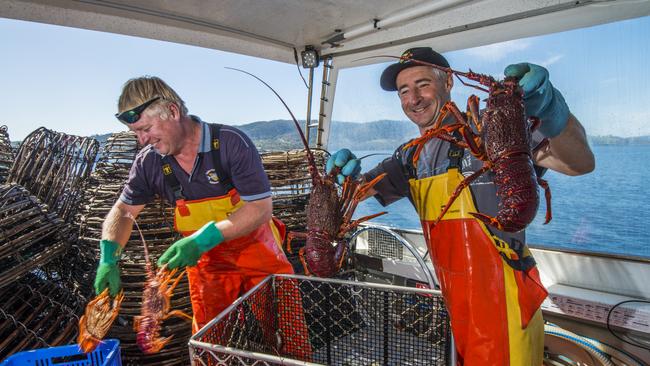New China trade ban fears hit wine, lobster exports
Australia’s lobster and wine industries have halted exports to China following ‘unverified reports’ of a sweeping ban to be imposed on Friday.

Australia’s lobster and wine industries have halted exports to China following “unverified reports” of a sweeping ban to be imposed on Friday, which is said to also include Australian sugar, copper, timber and coal.
The decision by China’s biggest lobster and wine supplier came after reports of an unusual, and unverified, meeting by Chinese officials, who are said to have co-ordinated a ban on imports from Australia across seven categories worth more than $6b a year.
If unresolved, the halt of supply from Australia – one of the world’s few agriculture suppliers that is almost COVID-19 free – will lead to price spikes in products for Chinese consumers in the lead up to the Lunar New Year holiday and end-of-year wedding season.
Labor has used the uncertainty to ramp up its attack on the federal government’s China trade policy.
“The Morrison Government must come up with an urgent plan to address the escalating concerns of Australian exporters,” said Labor trade spokesman Madeleine King.
Ambiguous responses by Australia’s biggest trading partner have increased calls for diversification from China. Long standing champions of the bilateral relationship have been reluctant to comment on the opaque situation.
The Seafood Trade Advisory Group, which has been working with the industry since almost $2m of live lobsters were spoiled in a 4-day hold up at Shanghai airport, said Australian producers were waiting for more information before resuming trade following “unverified reports” of the impending ban.
“We understand that many families in China are planning important occasions in November, particularly weddings,” said a spokesman for the Seafood Trade Advisory Group.
“By working together with our customers we believe that we can resolve this trade disruption ensuring commercial benefits to everyone,” he said.
Australia dominates the premium lobster trade in China, supplying 55 per cent in 2019, in sales worth more than $700m.
An ongoing halt will lead to a huge price spike in the banquet-heavy build up to the January Lunar New Year holiday. It would likely increase demand for inferior lobster from the United States, a coronavirus hot spot.
The end of year is also traditionally a booming time for the Australian wine industry, which in the last 12 months has sold more than $1.2b into China, surpassing France as its top import source.
At least one ship containing Australian wine was already on water before the trade ban rumours spread and is due to dock in Shanghai within a fortnight.
Further shipments of wine from Australia have also been halted as suppliers wait on more information.
“There’s a lot of rumour and speculation,” said Australian Grape and Wine chief executive Tony Battaglene.
The truth or otherwise of the reports would be revealed at China’s ports, he said. “That’s why Friday is D-Day.”
Circulated notes of the unverified meeting – which was spread widely among China-focused investment bank and trade analysts on social media platform WeChat – said that Australian goods that arrived after November 6, this Friday, would be “stuck at ports”.
On Thursday, Australia’s biggest listed wine company Treasury Wine Estates will hold its annual general meeting. The company has benefited hugely from the popularity of its Penfolds label in China.
The unverified meeting notes listed barley, wine, timber, coal, sugar and lobster, all products that have had trouble with Chinese authorities.
It also included copper and refined copper ore, which saw stock in ASX-listed Sandfire Resources fall 7 per cent on Tuesday. Sandfire recovered almost 2 per cent in early trading on Wednesday.
The unverified account also openly outlined a plan of denial: “Australian companies should be given unified business reasons for the suspension”, it reported.
Trade Minister Simon Birmingham – who has been unable to speak to his Chinese counterpart throughout this year’s trade drama – called for clarity on the situation.
A spokesman for China’s Ministry of Commerce in Beijing downplayed the reports.
“We did not hold such a meeting, neither did we issue the notice, nor do we know about such rumours,” a spokesman for the Ministry of Commerce told The Australian.
However, at a regular press conference in Beijing later on Tuesday, China’s foreign ministry would not directly answer a question on reports of the wide ranging ban.
“I’d like to emphasise that the Chinese authorities take inspection and quarantine measures on imported products in accordance with laws and regulations,” said foreign ministry spokesman Wang Wenbin.
“We hope Australia can do more to enhance mutual trust and bilateral co-operation, as the China-Australia comprehensive strategic partnership calls for, and bring the bilateral relations back to the right track as early as possible,” he said.
Labor’s trade spokesman Madeleine King said the government should seek counsel from Australian businesses engaged in trade with China.
She also said the government must develop a strategy to diversify Australia’s export markets, “while continuing to maximise trade with China”.
The Lowy Institute in June found 94 per cent of Australians wanted the federal government to pursue markets other than China.
In the months after that poll, China has announced an investigation that could cripple Australia’s wine exports to China, banned Queensland timber and refused to offer clarity on reports of a go-slow on Australian cotton and coal.
In 2019, Australia exported a record $149.2bn of goods to China.
Despite this year’s trade reprisals, Australia has exported more than $108b in the first 9 months of the year and is on track to record its second highest level.




To join the conversation, please log in. Don't have an account? Register
Join the conversation, you are commenting as Logout